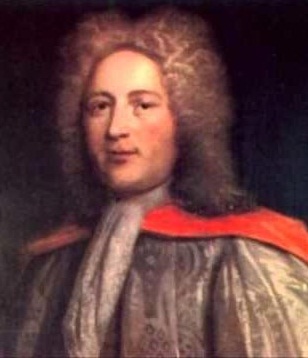<Back to Index>
- Composer and Organist Jeremiah Clarke, 1674
- Organist and Composer Richard Brind, 1670+
PAGE SPONSOR

Jeremiah Clarke (c. 1674 - 1 December 1707) was an English baroque composer and organist.
Thought to have been born in London around 1674, Clarke was a pupil of John Blow at St Paul's Cathedral. He later became organist at the Chapel Royal. After his death, he was succeeded in that post by William Croft.
Clarke is best remembered for a popular keyboard piece: the Prince of Denmark's March, which is commonly called the Trumpet Voluntary, written about 1700. From c. 1878 until the 1940s the work was attributed to Henry Purcell, and was published as Trumpet Voluntary by Henry Purcell in William Sparkes's Short Pieces for the Organ, Book VII, No. 1 (London, Ashdown and Parry). This version came to the attention of Sir Henry J. Wood, who made two orchestral transcriptions of it, both of which were recorded. The recordings further cemented the erroneous notion that the original piece was by Purcell. Clarke's piece is a popular choice for wedding music, and has featured in royal weddings.
The famous Trumpet Tune in D (also incorrectly attributed to Purcell), was taken from the semi - opera The Island Princess which was a joint musical production of Clarke and Daniel Purcell (Henry Purcell's younger brother) — probably leading to the confusion.
"A violent and hopeless passion for a very beautiful lady of a rank superior to his own" caused him to commit suicide. Before shooting himself, he considered hanging and drowning as options, so to decide his fate, he tossed a coin — however the coin landed in the mud on its side. Instead of consoling himself, he chose the third method of death, and performed the deed in the cathedral churchyard." Suicides were not generally granted burial in consecrated ground, but an exception was made for Clarke, who was buried in the crypt of St Paul's Cathedral (though other sources state he was buried in the unconsecrated section of the cathedral churchyard).
There were two other, lesser known British organists of the same name, who lived later but whose dates of birth are uncertain. One published four volumes of music between 1760 and 1791, and the other was the organist of Worcester Cathedral from 1806 - 1807.
Richard Brind (died March 1718) was an English organist and minor composer of the 17th century.
Born in England in the 1670s or 1680s, Brind was a chorister at St Paul’s Cathedral as boy and young teenager. While there, he sang under the directorship of John Blow and Jeremiah Clarke. After Clarke's death in 1707, he was appointed vicar - choral and, while not succeeding him as Master of the Choristers, he did take over his post as organist at St Paul's. According to music historian Sir John Hawkins, Brind was "no very celebrated performer", and, although five anthems are listed in Divine Harmony (London, 1712), none of his compositions survives. He died in London, and is best remembered today as a teacher to composer Maurice Greene.